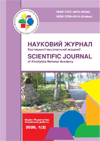UDC : 378.018.8.011.3-051:373.3] THE STUDY OF THE RELATIONSHIP BETWEEN THE LEVELS OF REFLEXIVITY AND INDICATORS OF SELF-ACTUALIZATION AMONG FUTURE PRIMARY SCHOOL TEACHERS IN HIGHER EDUCATION INSTITUTIONS
DOI : https://doi.org/10.51706/2707-3076-2020-2-10
Abstract
The article outlines the results of an empirical study investigating the correlation between the indicators of reflexivity and indicators of the self-actualization process among the students majoring in "Primary Education" (from 2 to 5 courses). The goal of the article is to provide a qualitative description of the established relationship between the studied properties. With the help of diagnostic methods, the relationship between the levels of students’ reflexivity was established with such indicators of their self-actualization as: components of the reflexivity process, types of reflexivity, life-purpose orientations, levels of student aspirations.
By studying the correlation of the reflexivity levels and individual self-actualization indicators of future teachers at a qualitative level, a link was established between them. In particular, the profile of a person with high and medium levels of reflexivity is characterized by the perspectiveness of reflection, i.e. marked tendency of future teachers towards thinking about future activities, planning, presenting the goal and results of their own professional activities; the expression of personal and professional components of reflection, which demonstrates their desire for self-awareness, attention to human nature, reflection on the potential of professional self-actualization; realistic level of aspirations, which distinguishes their confidence, persistence in achieving the goal and significant productivity.
The profile of a person with a low level of reflexivity is characterized by retrospectiveness of reflection, i.e. the tendency to analyze their own mistakes, thinking about the causes, preconditions, motives of activity; the expressiveness of the emotional component of reflection, which demonstrates the focus on primitive vision of human nature and prevalence of emotional evaluation of events, experience and events; unrealistic low level of aspirations, which causes difficulties in defining student goals and ways to achieve them, difficulties with the implementation of their own life plans, as well as increasing demands on others. One of the problems of such students may be planning their own actions in the near future and their correlation with the professional perspective.


